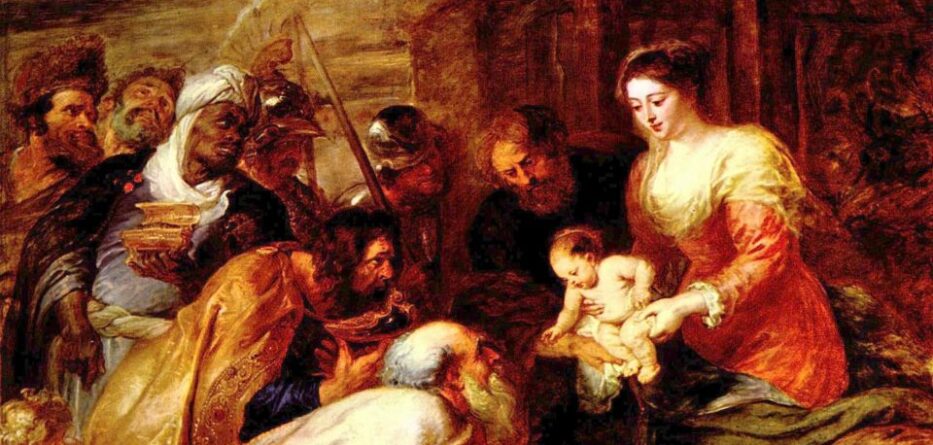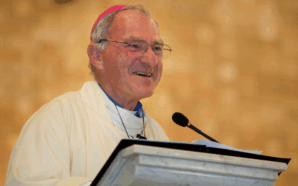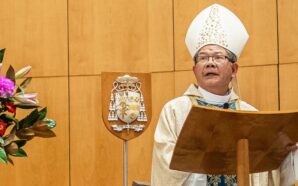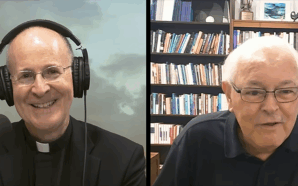Homily for the 6th Sunday of Easter, 5 May 2024
Readings: Acts 10:25-26,34-35,44-48; Psalm 97; 1 John 4:7-10; John 15:9-17
It’s been a week of people talking past each other and abusing each other. Think only of the protest outside Parliament House with the tension between the prime minister and the convenor of the rally protesting domestic violence; or consider the student protests on university campuses in relation to the Gaza war.
Listen at https://soundcloud.com/frank-brennan-6/homily-5524
In today’s first reading from the Acts of the Apostles, we hear another story of the meeting between Jewish and Gentile Christians. You will recall Paul came into dialogue with the first Christians after both he and Ananias had received visions showing them the way to break down their differences and to trust. Now we have Peter and the centurion Cornelius, each of whom has a vision suggesting that it would be a good thing if they got to know each other.
The angel tells Cornelius: ‘Your prayers and charitable gifts have been accepted by God.’ This Gentile is told to reach out to Peter. Peter, an observant Jew who would not eat anything profane or unclean, has a vision that he can eat anything because ‘What God has made clean, you have no right to call profane’. The centurion sends one of his loyal soldiers and two slaves to fetch Peter. Peter travels the 50 km along the coast from Jaffa to Caeserea and stays in the home of Cornelius, eating whatever is put in front of him. Peter then addresses the people: ‘I now really understand that God has no favourites, but that anybody of any nationality who fears him and does what is right is acceptable to him.’
The six good Jewish Christians who had accompanied Peter from Jaffa to Caeserea ‘were all astonished that the gift of the Holy Spirit should be poured out on Gentiles too’. Peter goes ahead and baptises those who have received his message, saying, ‘Could anyone refuse the water of baptism to these people, now they have received the Holy Spirit just as we have?’
When Peter finally got back to Jerusalem, the good, law abiding Jewish Christians who had never dined or stayed with Gentiles expressed their concerns. They weren’t so much concerned about Peter’s decision to baptise these Gentiles. Their first protest was: ‘You have been visiting the uncircumcised and eating with them.’ Justifying his actions, Peter says, ‘I realised that God was giving them the identical gift he gave to us when we believed in the Lord Jesus Christ; and who was I to stand in God’s way?’
The Jerusalem authorities were satisfied saying, ‘God has clearly granted to the Gentiles too the repentance that leads to life.’ One of the refreshing things about Pope Francis is that he has been so willing to overlook legalistic prescriptions on all manner of things asking: who are we to stand in God’s way?
In the midst of conflict and division, let’s be open to any invitation to meet, to receive hospitality and to share a meal. Jesus tells us in today’s gospel, we are commissioned to go out and to bear fruit, fruit that will last’. This sounds simple enough, but we all know there are complex, highly charged emotional situations where the invitation to dine or stay is unlikely to be forthcoming. Waiting for the door to open, we need open hearts and open minds.
During the week, Henry Ergas drawing on the thinking of Immanuel Kant, wrote: ‘We can only think for ourselves by thinking with others, perfecting our own humanity, and coming to recognise the humanity of our interlocutors, by breaking preconceptions against the hard rock of facts and disputes. And thinking with others – the “one treasure which remains amid all the burdens of civil life”.’[1]
Wondering what, if any, contribution we Christians might make to those situations in the public square where people are simply talking past each other and abusing each other, I find some consolation and inspiration in the 2007 address given by Rowan Williams when he was Archbishop of Canterbury speaking in the serene, austere Kings College Chapel at Cambridge with the beautiful Rubens painting of the Adoration of the Magi behind the altar, the Magi being Gentiles of differing ethnicities. Williams was speaking at a Christian-Muslim forum. He said: ‘The significance of the church for civil society is in keeping alive a concern both to honour and to justify the absolute and non-negotiable character of the human vision of responsibility and justice that is at work in all human association for the common good.’ He went on to say, ‘The church needs to establish its credentials as “non-violent”: that is, as not contending against other kinds of human groups for a share in ordinary political power. …[T]he church is most credible when least preoccupied with its security and most engaged with the human health of its environment; and to say “credible” here is not to say “popular”, since engagement with this human health may run sharply against a prevailing consensus.’[2]
We pray:
The Lord has revealed to the nations his saving power.
The Lord has made known his salvation;
has shown his justice to the nations.
He has remembered his truth and love
for the house of Israel.
The Lord has revealed to the nations his saving power.
All the ends of the earth have seen
the salvation of our God.
Shout to the Lord, all the earth,
ring out your joy.
The Lord has revealed to the nations his saving power.
From the start of 2024, Fr Frank Brennan SJ will serve as part of a Jesuit team of priests working within a new configuration of the Toowong, St Lucia and Indooroopilly parishes in the Archdiocese of Brisbane. Frank Brennan SJ is a former CEO of Catholic Social Services Australia (CSSA). Fr Frank’s latest book is An Indigenous Voice to Parliament: Considering a Constitutional Bridge, Garratt Publishing, 2023 and his forthcoming book is ‘Lessons from Our Failure to Build a Constitutional Bridge in the 2023 Referendum’ (Connor Court, 2024).
[1] See https://www.theaustralian.com.au/commentary/the-answer-to-censors-must-always-be-dare-to-know/news-story/acfc23d7ccda3d44e3903625b4c9cd97
[2] Rowan Williams, ‘Faith communities in a civil society’, in Faith in the Public Square, Bloomsbury, 2012, 302 at pp. 307-8.








